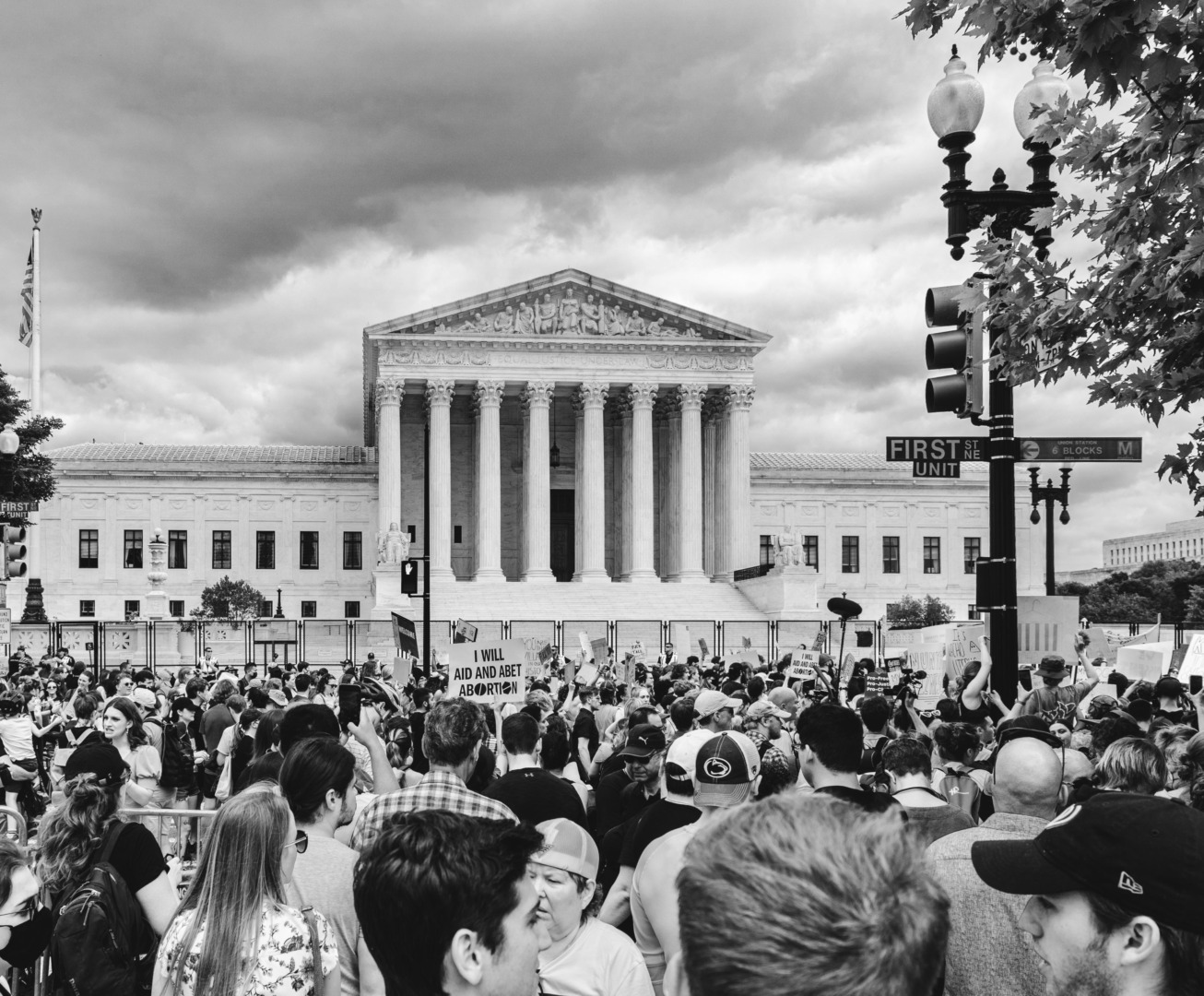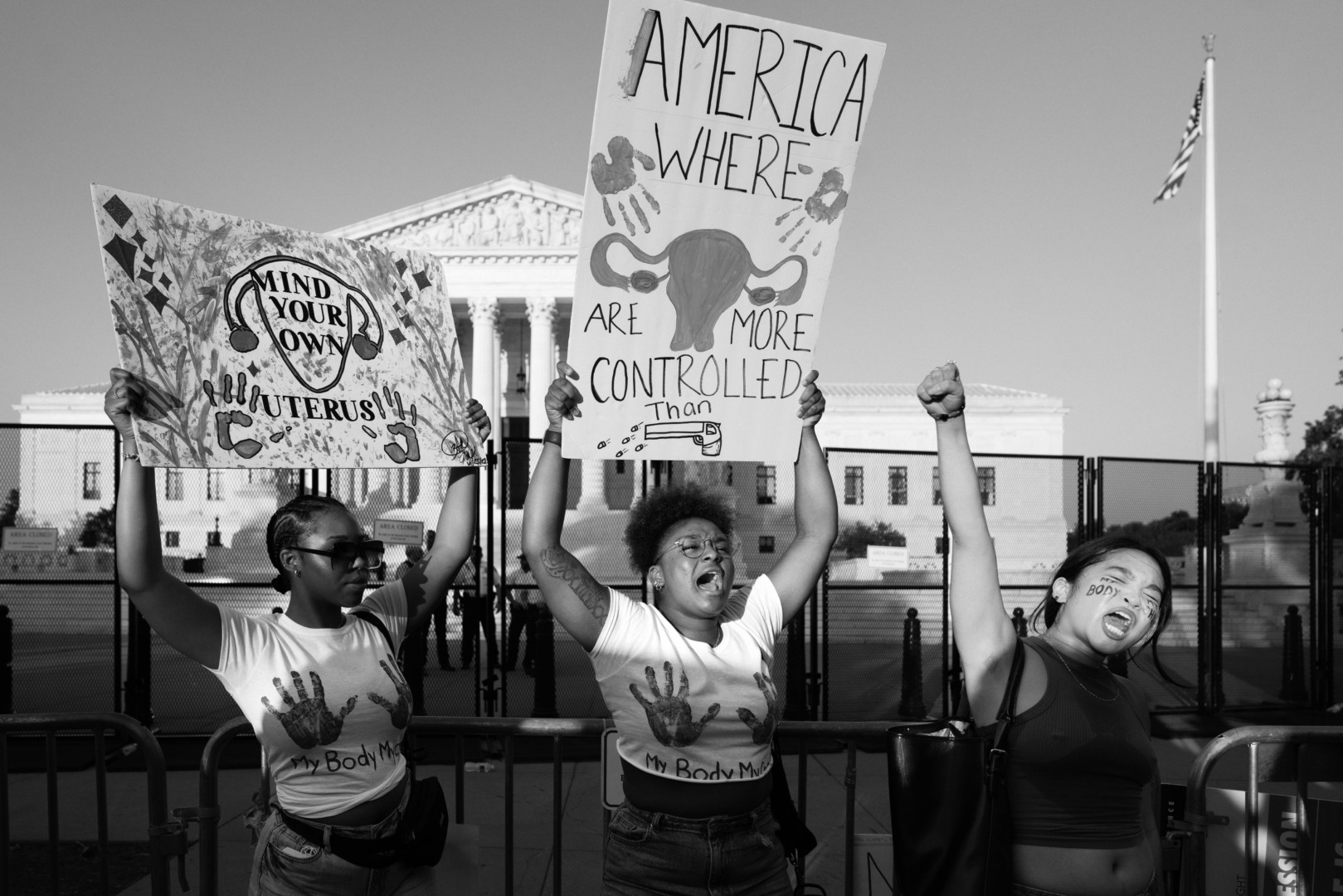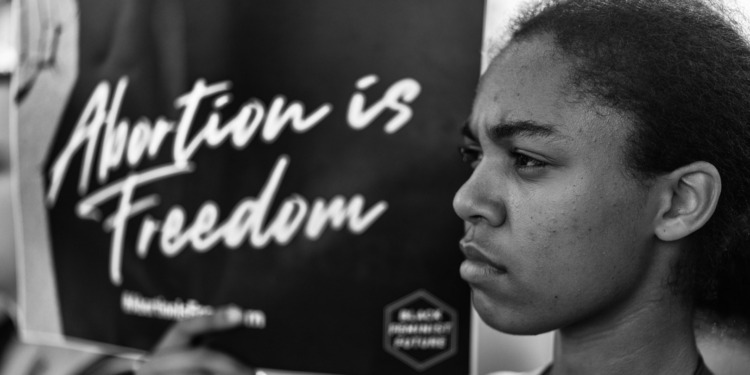The US Supreme Court has overturned the 1973 Roe v. Wade ruling, officially revoking the federal constitutional right to an abortion on a 5-4 vote that sent shockwaves across the nation and the world.
The court’s decision to abrogate nearly five decades of rulings bolstering the right to terminate a pregnancy was supported by five of the court’s six conservative justices, while Chief Justice John Roberts and the court’s three liberal justices voted against overruling Roe.
The bombshell ruling is now known as Dobbs v. Jackson Women’s Health Organization after the case brought against the state of Mississippi by its last standing abortion clinic when, in March 2018, the Mississippi Legislature passed a ban on any abortion procedure after the first 15 weeks of pregnancy, even in cases of rape or incest.
The law directly challenged Roe, under which all states were prohibited from banning abortion before foetal viability, generally within the first 24 weeks.
Roe protected the right to an abortion on the basis that a person’s choice to terminate a pregnancy was implicit in the right to privacy, itself bolstered by the Fourteenth Amendment to the United States Constitution.
As foreshadowed in the draft opinion leaked in May, its author Justice Samuel Alito and the other four conservative justices reject the idea that abortion falls within the purview of a right to privacy, arguing that there was no historical precedent in the US legal tradition to back such ruling.
The 1992 Planned Parenthood v. Casey court decision – which essentially endorsed Roe by decreeing that states could not place an “undue burden” on those seeking an abortion prior to foetal viability – was overruled alongside the 1973 precedent.

The abrogation of Roe v. Wade marked the start of a new political, social, legal, and medical era as the ruling hurls generations of Americans into the unknown. Now that power has been returned to the states to legislate on abortion, up to 26 states – about half of the United States – could wind up introducing total bans or severe restrictions on abortion procedures.
Prior to the court’s decision, 13 states had “trigger laws” set to come into effect immediately after Roe is overturned. As of Monday, the trigger laws have officially come into effect in five states: Arkansas, Kentucky, Louisiana, Missouri, and South Dakota. In other states where abortion is illegal or at risk, abortion services have been suspended.
In the states of Idaho, North Dakota, Tennessee, Texas, Mississippi, and West Virginia, a total ban on all abortion procedures is pending.
In the states of Montana, Nebraska, Michigan, Iowa, Kansas, Indiana, Virginia, Pennsylvania, and North Carolina, the legal status of abortion remains uncertain and will depend on new legislation or change in party control.
News of the ruling sent shockwaves that were felt across the entire nation and the world – and fallout from the landmark ruling is likely to be felt to a similar extent as the rage and grief of pro-choice activists collide with the elation and revived determination of opponents to abortion.
Soon after the supreme court struck down Roe, thousands of protestors took it to the streets, gathering in major cities and smaller towns across the nation, including in New York City, Los Angeles, Chicago, Kansas City, Houston, Nashville, Topeka, Detroit, Tallahassee, Miami, Oklahoma, Boise, New Orleans, and Austin.
Though most of the demonstrations were peaceful, growing tensions led to a number of arrests and clashes with law enforcement. In Arizona, people protesting before the state capitol building in Phoenix were sent fleeing when police fired tear gas – which, for the record, is a known abortifacient – without warning.
Firing teargas right into the crowd straight from the Capitol windows https://t.co/XeZ59XVotJ pic.twitter.com/NwBtpTrSCt
— AZ Right Wing Watch (@az_rww) June 25, 2022
Solidarity protests also erupted in London, Berlin, Paris, and Perth.
In France, the Supreme Court’s decision sparked renewed discussions about incorporating the Veil law – which endorses a right to abortion – in the French constitution, evidencing the extent of the shock and fear the Supreme Court’s ruling dispersed beyond national borders.
In a similar move, Israel has eased its regulations on access to abortion, enabling patients to obtain abortion pills through the country’s universal health system and removing a long-established obligation that women appear physically in front of a special committee before they are allowed to terminate a pregnancy.
Israel’s health minister, Nitzan Horowitz, described the Supreme Court’s recent ruling as “a sad process of women’s repression, setting the leader of the free and liberal world 100 years back.”
And not only does it look like the overturning of Roe will make the US an outlier in terms of human rights on the international scene – the country is the first to restrict abortion access in nearly 30 years – but sets the nation up for years of internal unrest and conflict.
One of the Supreme Court’s justifications for overruling Roe is that the decision brings an end to fifty years of quarrelsome national controversy. But the vast mobilisations in the streets nationwide, as well as recent polls suggesting 59% of Americans disapprove of the ruling, presage a daunting future of fierce battles and extraordinay division.
One thing is for certain: by stripping a large portion of Americans of a constitutional right on the one hand and invigorating an adverse faction with a clear-cut ultra-conservative agenda on the other, the Supreme Court’s decision aggravates political tensions in a country already plagued with soaring rates of violence, including mass shootings, hate crimes, and political instability that culminated in the Capitol riot in January 2021.
As anti-abortion groups ramp up efforts to uphold bans, others fear the Supreme Court won’t stop at Roe
The fall of Roe triggered hectic activity on both sides of the abortion fight, with defenders of reproductive rights taking it to the streets, vowing to fight back in courts and polling booths, and anti-abortion factions getting ready to press ahead for near-total bans on abortion across the nation.
The National Right to Life Committee released a memorandum proposing a “model abortion law for a post-Roe Nation” and renewed calls for the ban on abortion to be inscribed as an amendment in the constitution.
Their proposed model anti-abortion law bolsters a hard-line enforcement regime criminalising any person involved in abortions, including through the “giving of instructions over the telephone, the internet, or any other medium of communication regarding self-administered abortion.”
Thomas Lecaque, a historian who specialised in the conflation of religion and political violence, called the memorandum a “blueprint for a Christian nationalist surveillance state.”
The surveillance state will be weaponized to surveil birth control, sexual orientation, sexual practices, the works. You have to know that Christian nationalism does not stop taking. It keeps going until it has taken everyone who is not the winning denomination.
— Thomas Lecaque (@tlecaque) June 22, 2022
Many fear the wrenching of Roe from under the Fourteenth Amendment – which founds the constitutional rights to privacy – marks the beginning of an era of judicial overreach, striking down other substantive rights to privacy and allowing the strengthening of a surveillance state.
As soon as the draft opinion overturning Roe was leaked, legal experts warned any data-collecting device such as computers, phones, and the apps installed could become a potential instrument of surveillance in the investigation and prosecution of people seeking to access or providing abortions.
As abortion becomes criminalised, courts could issue a warrant to search a suspect’s phone, or flat-out sidestep asking for a warrant by going directly to private tech companies and buying personal data from them. And it’s not just law enforcement who has access to digital footprints: anti-choice groups like the Christian fundamentalist group Operation Rescue have been buying the personal data of abortion providers for years, compiling lists of names, workplaces, and even home addresses on a giant database, AbortionDocs.org.
Hence privacy experts are urging women to delete their period-tracking app, which can know whether its user is pregnant before she knows herself. As the Health Insurance Portability and Accountability Act (HIPPA), which protects patients against privacy violations, does not apply to apps, the women’s health data collected on the app can be accessed for a fee.
Other concerns revolve around the possibility that the Supreme Court attacks the substantive rights protecting same-sex intercourse, same-sex marriage, and access to contraception which, like Roe, had previously been found to fall under the category of a right to privacy.
Last Friday, though he acknowledged in a separate opinion that the end of Roe did not directly affect any right besides abortion, conservative justice Clarence Thomas nonetheless hinted at the possibility that the court may next turn its attention to the constitutional rights to contraception and LGBTQ+ rights.
“In future cases,” he wrote, “we should reconsider all of this Court’s substantive due process precedents, including Griswold, Lawrence, and Obergefell.”
The 1965 Griswold v. Connecticut ruling had found that married couples have a right to access contraceptives. In the 2003 Lawrence v. Texas case, the court ruled states could not outlaw consensual gay sex. Finally, the 2015 Obergefell v. Hodges court decision established a constitutional right to same-sex marriage.
The court’s three liberal justices, Stephen Breyer, Sonia Sotomayor, and Elena Kagan – denounced the assertion in Alito’s opinion that no other substantive right would be attacked as a deceptive statement.
“Either the mass of the majority’s opinion is hypocrisy or additional constitutional rights are under threat,” the liberal justices wrote. “It is one or the other.”
The struggle to restore abortion rights could last for generations
Constitutional and legal experts warned that restoring federal guarantees of abortion rights could take generations as no short-term solution is available outside statute law to challenge the Supreme Court’s abrogation of Roe.
“We’re in for a long, tangled, chaotic and, in terms of human suffering, horribly costly struggle,” says the Harvard constitutional law expert Lawrence Tribe, who also described the Supreme Court’s ruling as “unprincipled.”
Though there are no immediate solutions to challenge the Supreme Court’s decision, several options exist to alleviate the damage caused by the overturning of Roe.
One of them consists of empowering the Department of Health and Human Services (HHS), a branch of the US federal government created to protect the health of all Americans, or/and the Food and Drug Administration (FDA) – a federal agency within the HHS – to override state laws banning abortion procedures.
This could enable abortion-inducing medications to continue to circulate in states where abortion is illegal. On Friday, attorney general Merrick Garland said in a statement that states cannot ban mifepristone, a pill used to induce an abortion, for it would disagree with the FDA’s judgment about its safety and efficacy.
Another way to minimize the erosion of abortion rights can be found in state constitutions that have their own protections around freedom and equality – which would lay the foundation for a lawsuit against the state if it were to try and ban abortion.

A lawsuit was recently brought up against the state of Florida by a Boynton Beach synagogue, stating that Florida’s ban on abortions after 15 weeks of pregnancy violates the state constitution’s guarantee of religious freedom.
“For Jews, all life is precious and thus the decision to bring new life into the world is not taken lightly or determined by state fiat,” the lawsuit said. “In Jewish law, abortion is necessary if required to protect the health, mental or physical well-being of the women or for many other reasons not permitted (by Florida’s law).”
Many among the American public and politicians have accused the Supreme Court’s conservative justices of imposing a religious, and more specifically a Christian fundamentalist definition of life, which not only cannot be forced upon non-believers but is not even shared across religious communities among whom views on abortion and abortion rights may widely differ.
Planned Parenthood of America, the Center for Reproductive Rights and the American Civil Liberties have also sued Florida to block the Republican-backed law, saying it violates the right to privacy enshrined in the state’s constitution. The judge will soon decide whether to temporarily block the law before it comes into effect on Friday.
Taking advantage of the confusion over states laws on abortion, many abortion rights groups issued a legal challenge against their state to buy some time.
On Monday, a case brough before Judge Giarruso by Hope Medical Group for Women in Shreveport, one the three abortion clinis in Louisiana, led to a temporary restraining order blocking the ban, enabling abortion care services to resume for the time being.
In Utah, Ohio, and Arizona, Planned Parenthood and civil rights advocates also gather forces to challenge their respective states’ ban on abortion procedures.
More significantly, on Monday, a group of 22 attorneys general released a joint statement vowing to “leverage our collective resources” to assist people seeking an abortion in states where the procedure is banned.
Prosecutors in some Democratic-led cities in Republican states have stated they will not enforce abortion bans, sparking calls from anti-abortion forces, including the National Right to Life Committee, to bring legal proceedings against them.
An additional idea which circulates among Democratic politicians and abortion rights groups consists in expanding the Supreme Court and adding pro-choice justices in a bid to restore abortion rights – an operation which would require a majority of the House and 50 senators as well as a filibuster reform.
As Democrats currently control the House, holding 221 seats to the Republicans’ 208 (six seats are vacant) and the Senate is equally split with 50 seats on both sides, the change appears doable. However, House press secretary Karine Jean-Pierre told reporters on Saturday that President Biden “does not agree” with the idea.
The birth of the post-Roe era was (adequately) brought about by force. Fallout from Donald Trump’s presidency and the Supreme Court’s hard-line rulings enabled deep fractures to multiply across the political, social, and cultural landscape of the US – and if the restoration of abortion rights may take decades, the erosion of other key liberties and the legal mechanisms that protect them may not.
As individual Republican-led states, internal dissidents, and the federal government led by Biden’s administration are likely to engage in pitched battles over the issue in the years to come, the fall of Roe and its aftermath dramatically escalates the stakes of the midterm elections next November.
The midterm elections – so-called because they happen nearly two years into a President’s term – focus on the two chambers of Congress: the House of Representatives, where 435 seats will be up for election, and the Senate, where 35 seats are also up for grabs. There are also gubernatorial and local elections across the country.
The midterm elections are known for providing an assessment of how well a presidency is going – and the president’s party is traditionally expected to do badly. If the Democrats lose the House, they will struggle to pass legislation even more than they already are.
However, and as projected months prior to the official end of Roe, the current battle over abortion rights is likely to reshuffle the cards by jolting disaffected voters into action.
“This fall, Roe is on the ballot,” said President Biden on Friday. “Personal freedoms are on the ballot.”
As Democrats focus on the erosion of abortion rights, and the prospects of other freedoms being taken away, to redirect the outpouring of anger and worry into votes in their favour, Republicans send out a less unified message. Some, like Republican Senate candidate in Nevada Adam Laxalt, quickly shifted focus after celebrating the “victory for the sanctity of life.”
“It won’t distract voters from unaffordable prices, rising crimes, or the border crisis,” he said.
The reason behind this may be that Republicans themselves, or at least some among them, fear the Supreme Court’s hard-line standing will affect their chances of success during the midterm elections.
Rumours spread that even Donald Trump has privately told advisers and friends he believed the decision will be “bad for Republicans” as it will anger the demographic of suburban women who helped tilt the 2020 presidential runoff in favour of Biden.
At a Trump rally in Illinois last Saturday, Republican representative Mary Miller thanked Donald Trump for the “historic victory for white life” that the overturning of Roe represents (the same woman is known for having quoted Hitler in a public speech before the US Capitol last year).
Rep. Mary Miller (R-IL) thanks former President Donald Trump for the “historic victory for white life,” referencing Friday’s Supreme Court decision in Dobbs v. Jackson. pic.twitter.com/vu4tOx71V2
— Heartland Signal (@HeartlandSignal) June 26, 2022
But when asked in an interview with the New York Times about the central role he played in the overturning of Roe, Donal Trump answered: “I never like to take credit for anything.”
A most unusual comeback for a former President not exactly renown for his humility, suggesting that the spread of disunity in the wake of the Supreme Court’s decision has not spared Republican ranks – will not spare anyone.
Editor’s Note: The opinions expressed here by Impakter.com columnists are their own, not those of Impakter.com. — In the Featured Photo: Young woman protesting at the Supreme Court on Friday, June 24. Featured Photo Credit: Miki Jourdan.










